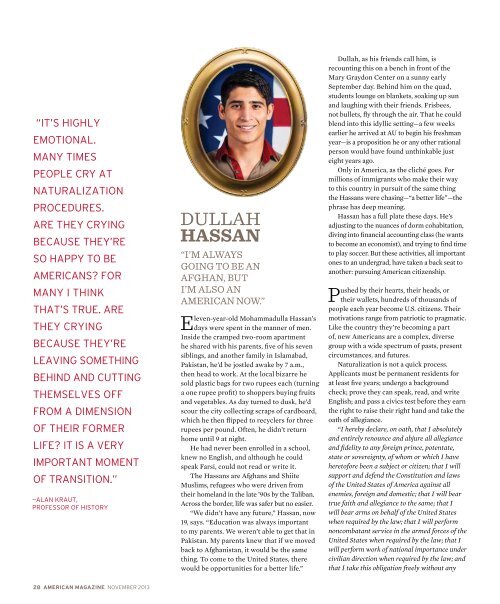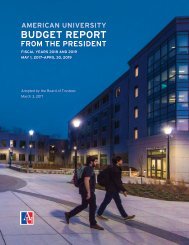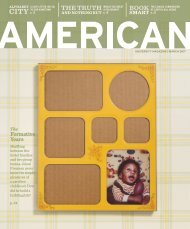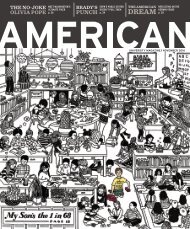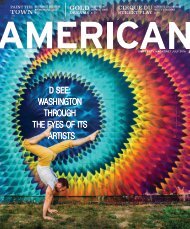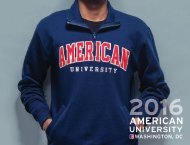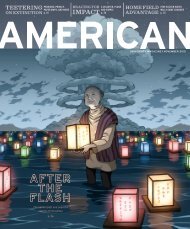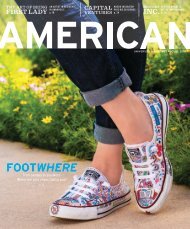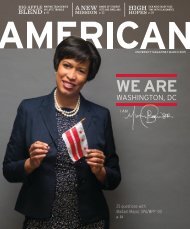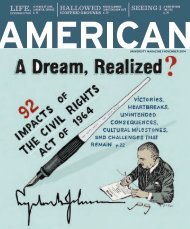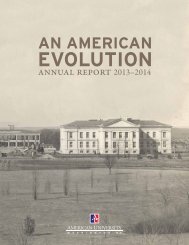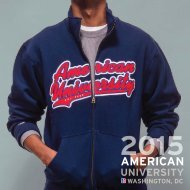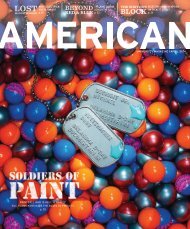American Magazine, Nov. 2013
The flagship publication of American University. This magazine offers a lively look at what AU was and is, and where it's going. It's a forum where alumni and friends can connect and engage with the university.
The flagship publication of American University. This magazine offers a lively look at what AU was and is, and where it's going. It's a forum where alumni and friends can connect and engage with the university.
Create successful ePaper yourself
Turn your PDF publications into a flip-book with our unique Google optimized e-Paper software.
“It’s highly<br />
emotional.<br />
Many times<br />
people cry at<br />
naturalization<br />
procedures.<br />
Are they crying<br />
because they’re<br />
so happy to be<br />
<strong>American</strong>s? For<br />
many I think<br />
that’s true. Are<br />
they crying<br />
because they’re<br />
leaving something<br />
behind and cutting<br />
themselves off<br />
from a dimension<br />
of their former<br />
life? It is a very<br />
important moment<br />
of transition.”<br />
—Alan Kraut,<br />
professor of history<br />
“I’m always<br />
going to be an<br />
Afghan, but<br />
I’m also an<br />
<strong>American</strong> now.”<br />
Eleven-year-old Mohammadulla Hassan’s<br />
days were spent in the manner of men.<br />
Inside the cramped two-room apartment<br />
he shared with his parents, five of his seven<br />
siblings, and another family in Islamabad,<br />
Pakistan, he’d be jostled awake by 7 a.m.,<br />
then head to work. At the local bizarre he<br />
sold plastic bags for two rupees each (turning<br />
a one rupee profit) to shoppers buying fruits<br />
and vegetables. As day turned to dusk, he’d<br />
scour the city collecting scraps of cardboard,<br />
which he then flipped to recyclers for three<br />
rupees per pound. Often, he didn’t return<br />
home until 9 at night.<br />
He had never been enrolled in a school,<br />
knew no English, and although he could<br />
speak Farsi, could not read or write it.<br />
The Hassans are Afghans and Shiite<br />
Muslims, refugees who were driven from<br />
their homeland in the late ’90s by the Taliban.<br />
Across the border, life was safer but no easier.<br />
“We didn’t have any future,” Hassan, now<br />
19, says. “Education was always important<br />
to my parents. We weren’t able to get that in<br />
Pakistan. My parents knew that if we moved<br />
back to Afghanistan, it would be the same<br />
thing. To come to the United States, there<br />
would be opportunities for a better life.”<br />
Dullah, as his friends call him, is<br />
recounting this on a bench in front of the<br />
Mary Graydon Center on a sunny early<br />
September day. Behind him on the quad,<br />
students lounge on blankets, soaking up sun<br />
and laughing with their friends. Frisbees,<br />
not bullets, fly through the air. That he could<br />
blend into this idyllic setting—a few weeks<br />
earlier he arrived at AU to begin his freshman<br />
year—is a proposition he or any other rational<br />
person would have found unthinkable just<br />
eight years ago.<br />
Only in America, as the cliché goes. For<br />
millions of immigrants who make their way<br />
to this country in pursuit of the same thing<br />
the Hassans were chasing—“a better life”—the<br />
phrase has deep meaning.<br />
Hassan has a full plate these days. He’s<br />
adjusting to the nuances of dorm cohabitation,<br />
diving into financial accounting class (he wants<br />
to become an economist), and trying to find time<br />
to play soccer. But these activities, all important<br />
ones to an undergrad, have taken a back seat to<br />
another: pursuing <strong>American</strong> citizenship.<br />
Pushed by their hearts, their heads, or<br />
their wallets, hundreds of thousands of<br />
people each year become U.S. citizens. Their<br />
motivations range from patriotic to pragmatic.<br />
Like the country they’re becoming a part<br />
of, new <strong>American</strong>s are a complex, diverse<br />
group with a wide spectrum of pasts, present<br />
circumstances, and futures.<br />
Naturalization is not a quick process.<br />
Applicants must be permanent residents for<br />
at least five years; undergo a background<br />
check; prove they can speak, read, and write<br />
English; and pass a civics test before they earn<br />
the right to raise their right hand and take the<br />
oath of allegiance.<br />
“I hereby declare, on oath, that I absolutely<br />
and entirely renounce and abjure all allegiance<br />
and fidelity to any foreign prince, potentate,<br />
state or sovereignty, of whom or which I have<br />
heretofore been a subject or citizen; that I will<br />
support and defend the Constitution and laws<br />
of the United States of America against all<br />
enemies, foreign and domestic; that I will bear<br />
true faith and allegiance to the same; that I<br />
will bear arms on behalf of the United States<br />
when required by the law; that I will perform<br />
noncombatant service in the armed forces of the<br />
United States when required by the law; that I<br />
will perform work of national importance under<br />
civilian direction when required by the law; and<br />
that I take this obligation freely without any<br />
28 <strong>American</strong> <strong>Magazine</strong> NOVEMBER <strong>2013</strong>


